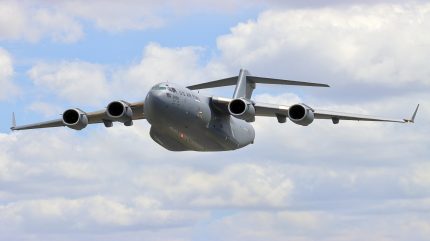
The US Air Force (USAF) has failed to pay fair and reasonable prices for spare parts purchased for the C‑17 military transport aircraft, an audit by the US Department of Defense Office of Inspector General (DoD OIG) has revealed.
The DoD OIG has released a report titled “Audit of C-17 Spare Parts Pricing,” which revealed the findings.
Cargo aircraft C-17 spare parts are manufactured by aerospace company Boeing.
The audit, initiated in response to a DoD Hotline allegation, assessed the fairness of prices under performance-based logistics contracts in line with the Federal Acquisition Regulation.
US DoD Inspector General Robert Storch said: “The Air Force needs to establish and implement more effective internal controls to help prevent overpaying for spare parts for the remainder of this contract, which continues through 2031.
“Significant overpayments for spare parts may reduce the number of spare parts that Boeing can purchase on the contract, potentially reducing C-17 readiness worldwide.”
How well do you really know your competitors?
Access the most comprehensive Company Profiles on the market, powered by GlobalData. Save hours of research. Gain competitive edge.

Thank you!
Your download email will arrive shortly
Not ready to buy yet? Download a free sample
We are confident about the unique quality of our Company Profiles. However, we want you to make the most beneficial decision for your business, so we offer a free sample that you can download by submitting the below form
By GlobalDataThe DoD OIG found that about 26% of the spare parts reviewed, valued at $4.3m, were not purchased at fair and reasonable prices.
Moreover, the Air Force’s lack of cost data led to an inability to determine the fairness of prices for more than 54% of spare parts, worth more than $22m.
Additionally, the Air Force overpaid nearly $1m for a dozen different types of spare parts on the contracts.
Specifically, the allegations include the Air Force paying more than 80 times the commercially available cost for a lavatory soap dispenser, resulting in a 7,943% markup.
The DoD OIG identified several reasons for these overpayments, including the Air Force’s failure to validate contract negotiation data, conduct contract surveillance, and review invoices to ensure prices were fair before payment.
Furthermore, the DoD did not enforce a requirement for contracting officers to verify the accuracy of the bill of materials before negotiations or to scrutinise invoices for allowable, allocable, and reasonable costs before payment.
The DoD OIG has made eight recommendations to address these issues.
One of these urges the Commander of the Air Force Life Cycle Management Center to direct the C-17 contracting officer to review spare parts prices and justify any significant price increases from Boeing.
The other recommendations include tasking the Director of the Defense Contract Management Agency with reviewing Service Parts Management to assess the accuracy of forecasts for spare parts demands. If any inaccuracies are found during this review, corrective measures should be implemented.
Additionally, it recommended that the Principal Director of Defense Pricing, Contracting, and Acquisition Policy direct the Defense Acquisition Regulations Council to propose amendments to the Federal Acquisition Regulation to clarify the responsibilities of contracting officers.
The DoD OIG has committed to continue monitoring the DoD’s progress in implementing these recommendations to prevent future overpayments.


